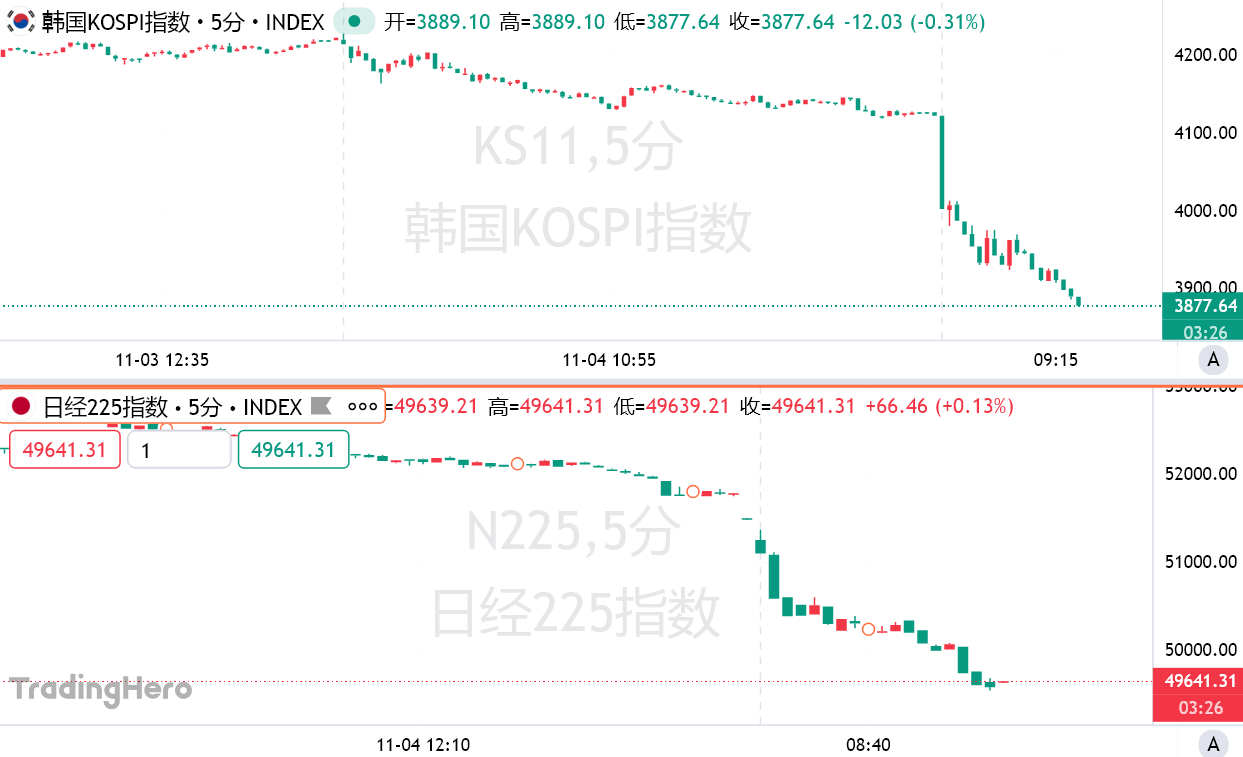Wall Street warns: This is just the beginning, the panic triggered by the AI bubble burst has only just started.
Author: Jin Shi Data
On Wednesday, Asian stock markets followed the overnight sell-off in U.S. stocks, as investor concerns over high valuations weakened market confidence.
As of the time of writing, the South Korean stock market led the decline with a drop of over 6%, as valuation concerns severely impacted recently strong-performing chip stocks, defense, and shipbuilding sectors. Chip manufacturers Samsung Electronics and SK Hynix were major contributors to the decline.
The KOSPI index fell below the critical 4000-point mark and retreated further from its historical high. This drop has resulted in a cumulative decline of over 7% over two days, marking the worst performance since August 2024.
After the Korea Exchange saw a 5% drop in the KOSPI 200 futures, it activated the circuit breaker mechanism, pausing programmatic trading for 5 minutes. As the decline expanded, the Korea Exchange also suspended programmatic trading for KOSDAQ futures.
So far this year, the South Korean stock market has been one of the best-performing markets globally, driven by renewed optimism about artificial intelligence and continued buying due to the president's push for corporate reform plans. However, recent warnings from Wall Street executives about excessive valuations are threatening to dampen investor enthusiasm.
"After a 20% surge in October alone, investors are showing fatigue, coupled with concerns about an AI bubble," said Huh Jae-Hwan, a strategist at Yuanta Investment Securities. "There are indeed areas in the market that resemble a bubble."

The Nikkei 225 index fell below 50,000 points for the first time since October 27, dropping 3.7% during the day.
The Taiwan Weighted Index opened down 1.67% on Wednesday. The Hong Kong Hang Seng Index opened down 0.97%, and the Hang Seng Tech Index opened down 1.75%. The A-shares Shanghai Composite Index opened down 0.95%, the Shenzhen Component Index opened down 1.68%, and the ChiNext Index opened down 2.08%.
U.S. stocks and European stocks index futures also continued to decline. The Euro Stoxx 50 index futures fell over 1%, the German DAX index futures fell 1%, and the UK FTSE index futures fell 0.4%.
Before the current pause in the global stock market rally, the booming outlook for artificial intelligence and expectations of continued interest rate cuts by the Federal Reserve had driven the U.S. stock benchmark index up nearly 40% from its April low. However, as the rally increasingly concentrated on a few stocks, both sentiment and technical indicators showed signs of overheating, with Wall Street giants pointing out that a market correction would be healthy for development.
After the CEOs of Wall Street giants Morgan Stanley and Goldman Sachs questioned whether sky-high valuations could be sustained, concerns grew that the stock market may have become excessively inflated. The "big short" archetype, hedge fund manager Michael Burry, exacerbated the sell-off after revealing his short positions on Palantir and Nvidia.
"Regardless of the medium to long-term trend, the stock market is prepared for some substantial correction in the short term," said Matt Maley, an analyst at Miller Tabak.
Chris Weston, head of research at Pepperstone Group, stated: "The entire market is a sea of red (down). There are not many reasons to buy now, and the market lacks short-term catalysts as we approach Nvidia's earnings report on November 19."
Mike Gitlin, CEO of Capital Group, said at a financial summit organized by the Hong Kong Monetary Authority on Tuesday that corporate earnings are strong but "the challenge lies in valuation levels."
"The market standards are constantly rising, and now slightly better-than-expected performance can no longer drive stock prices up," said Anna Wu, cross-asset strategist at Van Eck Associates in Sydney, during an interview with Bloomberg Television.
免责声明:本文章仅代表作者个人观点,不代表本平台的立场和观点。本文章仅供信息分享,不构成对任何人的任何投资建议。用户与作者之间的任何争议,与本平台无关。如网页中刊载的文章或图片涉及侵权,请提供相关的权利证明和身份证明发送邮件到support@aicoin.com,本平台相关工作人员将会进行核查。




